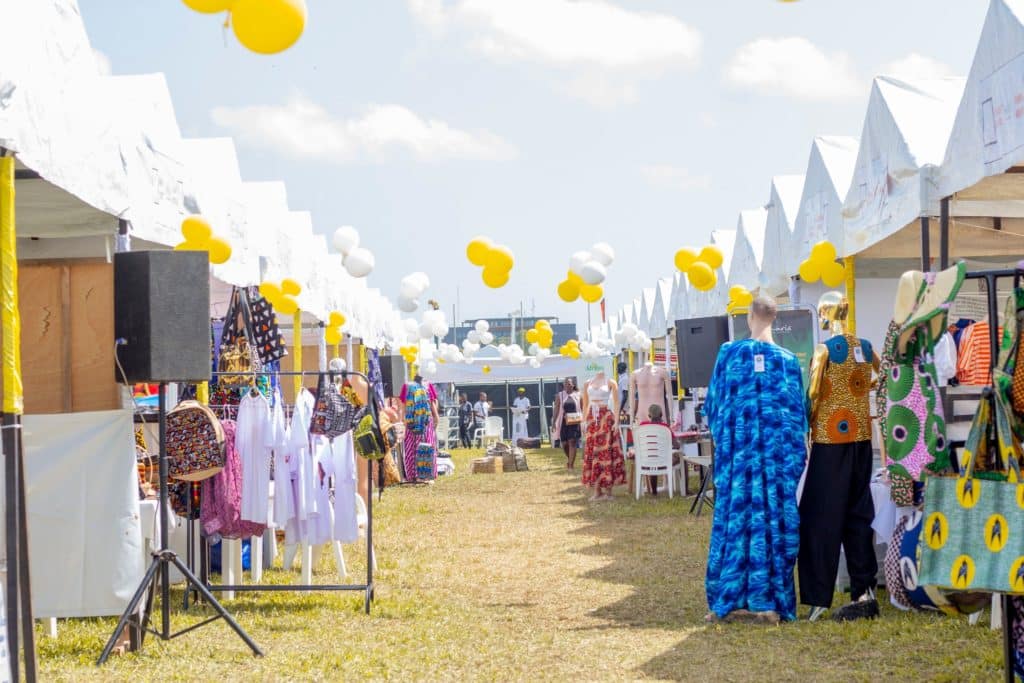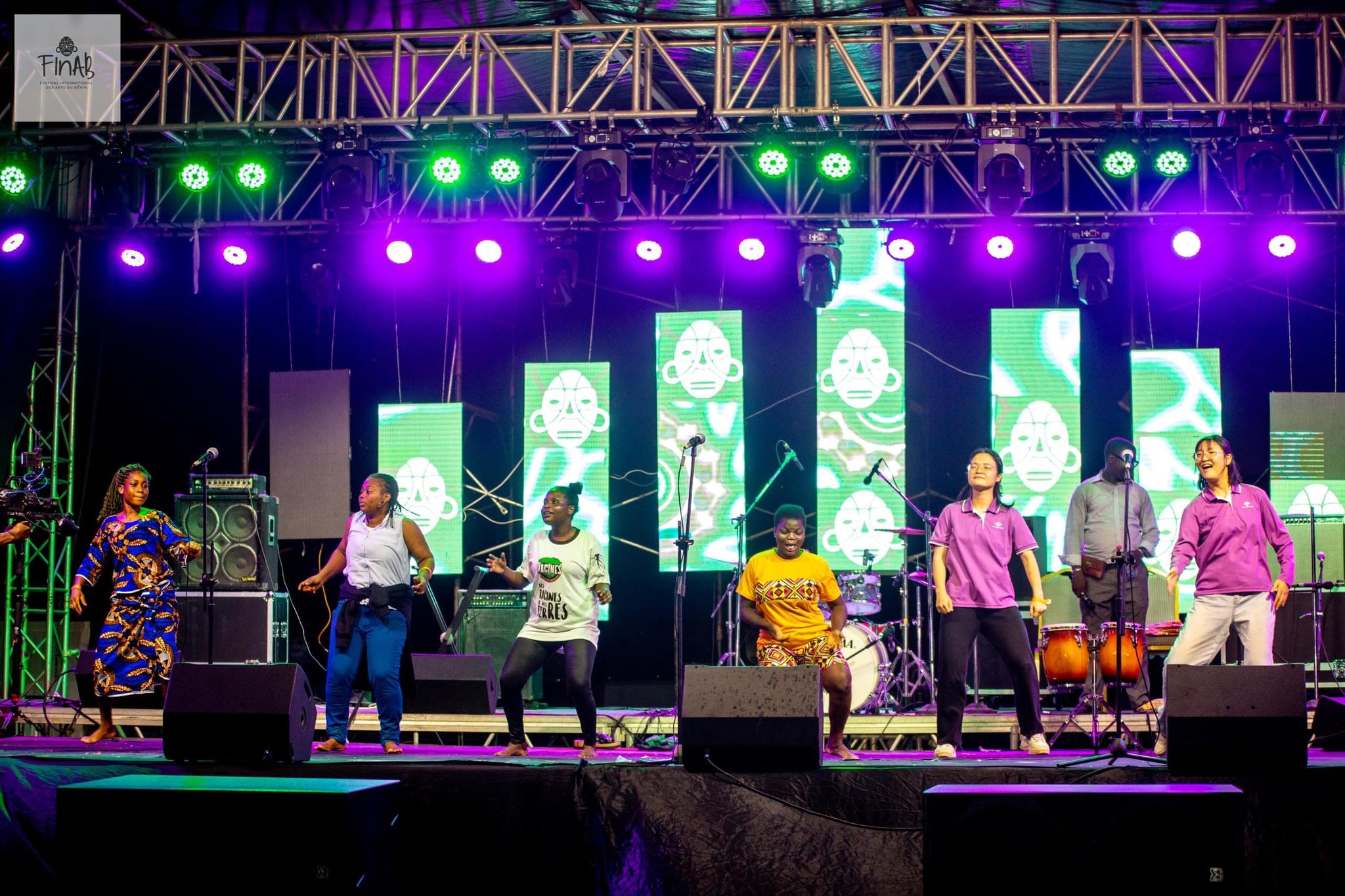FORBES AFRICA attended the second edition of the Benin International Arts Festival and found the tiny West African nation to be a hub of creativity with an emerging pool of talent.
As the sun dipped below the horizon, casting its glow over the streets of Cotonou, the Palais des Congrès (Congress Palace) and Place de l’Amazone (Amazon Square) came alive with an array of colors, rhythms, and stories from April 23 to 28 at the second edition of the Benin International Arts Festival (FinAB).
“FinAB is a multicultural platform that aims to unite youth and adults around their passions for the arts. It is a beautiful festival full of colors and rich in animation. The debate conferences on FinAB are moments of exchange where you learn a lot from our experts from across Africa,” shares Ulrich Adjovi, the founder of FinAB.
The air was electric with anticipation as artists, cultural mavens, and eager enthusiasts converged to explore a diverse range of topics, including the role of technology in advancing creative cultural industries, organizational and financial strategies within the fashion sector, monetization methods in the digital music landscape, the current state of the film industry, and the challenges surrounding financing festivals in Africa, under the theme: Identity and Multiculturalism: Impacts on Africa’s Creative Cultural Industries.
Def Jam Africa’s Expansion In French-Speaking Markets
Loading...
Trickling in on the second day of the festival was news of Universal Music France (UMF), a division of Universal Music Group (UMG), unveiling a collaboration with Binetou Sylla, Senegalese producer and founder of Wèrè Wèrè Music label, to lead Def Jam Africa’s expansion within French-speaking markets on the continent.
“It’s a partnership meant to expand opportunities for regional talent under a label [Def Jam Africa] I personally launched, which will continue to thrive within Universal Music,” Franck Kacou, Managing Director of Universal Music Africa, shares with FORBES AFRICA on the sidelines of the festival.
The alliance between Universal Music France and Sylla’s expertise represents a pivotal moment in African music’s global trajectory.
With the continent’s music market experiencing unprecedented growth, Kacou emphasizes the broader implications of this collaboration, stating, “This label also operates in English-speaking countries. The aim of this partnership is to promote African French-speaking urban country talent. It’s excellent news. Now, what has been achieved and what is currently underway in English-speaking countries should serve as inspiration for French-speaking counterparts. Instead of comparing these two realities, let’s draw inspiration from African English-speaking countries to nurture the development of the French-speaking African music industry.”
Unlocking Benin’s Cinematic Potential
Beninese film director and actor Kismath Baguiri underscores the urgent need for governmental intervention to invigorate the country’s cinematic landscape.
Baguiri says, “The Beninese government must create an administrative and legal framework to allow productions to flourish.”
“Creating a conducive environment for the development is crucial because without it, what life will these works have? Where will they be distributed? What will the return on investment be? What impacts will this have on the local economic sector?” queries Baguiri.
Highlighting the multifaceted potential of the industry, Baguiri states, “We are creatives. We are the spokespersons for the culture we want to sell locally and internationally. We are the creators of an art that goes beyond the artist.”
In advocating for collaboration, Baguiri stresses, “It’s important to engage with those who are already doing it successfully to understand what works for them and adapt it to our realities and context.”
Echoing Baguiri’s sentiments, another Beninese film director Claude Balogoun notes the urgent need for practical structuring within the film sector. “We need laws to govern cinema, especially the cinematographic code.”
Balogoun further mentions the importance of collaboration with other countries, citing Nigeria, Côte d’Ivoire, Ghana, and Burkina Faso as potential partners. “Benin benefits by opening up to others,” he states.
Securing Funding And Harnessing Economic Potential Of African Festivals
Senegalese rapper Didier Awadi explains the importance of a visionary approach: “You need to have a vision, be original, and demonstrate your commitment.” Awadi underscores the necessity of proving a project’s viability and profitability to attract investors, emphasizing the pivotal role of a solid foundation.

Highlighting the economic impact, Awadi points to festivals like the Timitar Festival in Agadir and the Niger’s Ségou Art festival in Mali as catalysts for local economic growth. “Those festivals change the mood of their respective cities,” he observes, noting the widespread engagement from hoteliers to artisans, positioning festivals as significant economic drivers.
Mohamed Doumbia, of the African Culture Fund in Mali, advocates for indigenous development as the cornerstone of sustainable festival financing. “We have always worked to gather local intelligences, strengths, and resources first, upon which we primarily rely to gradually build an organization similar to those in Northern countries,” Doumbia narrates.
Moroccan cultural manager Brahim El Mazned reflects on the need for continual justification and networking in securing funding. “In the cultural sector, nothing is granted,” he acknowledges, emphasizing the importance of building sustainable partnerships beyond single editions.
He adds: “All studies, whether in Africa or elsewhere, justify that culture has a significant impact on a country’s economy. For the community, a festival is an opportunity for reunions, joy, conviviality, wellbeing, and peace. That’s priceless.”
Influencer Grateful For Support
Beninese influencer Ery emerged victorious at the closing ceremony of the festival, showcasing her gratitude for the support she’s received.
“It’s grace and I just want to thank those who always support me,” Ery shares with FORBES AFRICA.
Acknowledging the expectations placed upon her, Ery reveals her determination to push further. “They are asking me to work hard. To not sleep again because this reward is like a boost. So I can’t stop,” she asserts.
Promising her followers more engaging content, she adds, “I will create more content, in music, dance to make proud my followers.”
Reflecting on the significance of personal branding in her field, Ery discloses its potential for lucrative opportunities. “I think that in our domain, it is important to build a brand and keep our image,” she explains. “Therefore thanks to your image, you can have many opportunities. By doing so, a big company hires your communication skills to promote their brand. That can be a big source of income for you and the company.”
Fashion Designer Praises Innovation In Local Fashion Scene
Beninese fashion designer Bakari Abdoul shares his excitement about the evolving fashion landscape in Benin, following his experience at the festival’s fashion parade.
“This is my first time attending this kind of show. A fashion parade like musicals,” Abdoul remarks. “I was not expecting such an innovation in Beninese fashion. I really like it and it is a pleasure to be among the first people that took part of it. The fashion industry is taking off in our country. It’s developing fast, because previously, nothing was moving on.”
“In a few years, Benin will be proudly represented all over the world. The fashion industry has a significant impact on the economy of the country. Our government noticed that and they started investing in our domain.”
Loading...
